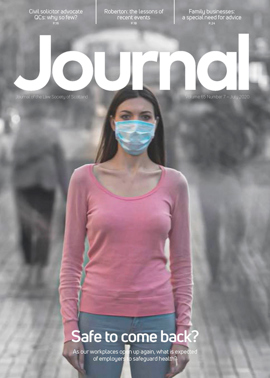COVID-19: planning a way ahead

This article summarises the legislative and policy steps that the Scottish Government (SG) has undertaken since March to ensure the continued operation of the planning system during the COVID-19 crisis. These steps are welcome and recognise the importance of a well-functioning planning system in assisting economic and social recovery and allowing appropriate development proposals to be consented.
Enforcing conditions
At the start of the outbreak, SG indicated (Chief Planner’s letter, 11 March 2020) a relaxation of enforcement regarding the operation of supermarkets, other retailers and distribution centres. Many of these developments are subject to controls (usually planning conditions) restricting the timing of delivery and other vehicles within set hours, usually in order to minimise adverse effects on residential amenity. The letter acknowledges that flexibility is needed in order that retailers can accept deliveries throughout the day and night. Accordingly, SG makes it clear that planning authorities should adopt a positive approach to the industry, to ensure that planning controls are not a “hard barrier to food delivery over the period of the coronavirus”.
A further letter dated 18 March 2020 indicated a similar relaxation of enforcement in relation to public houses and restaurants, indicating that planning authorities should not undertake enforcement action which would unnecessarily restrict them from providing takeaway services.
Both measures were intended to be in place for three months, and to be reviewed with the intention to withdraw them once the immediate urgency has subsided.
Coronavirus (Scotland) Act 2020
This Act came into force on 7 April and (1) extended the duration of planning permissions (including permissions in principle) due to expire during the “emergency period” (7 April to 6 October 2020) until 6 April 2021; (2) enables the publication of planning documents online as a substitute for requiring them to be available to view at physical locations; and (3) enables all committee meetings (including planning committees) to take place without the public attending.
In force on 27 May, the Coronavirus (Scotland) (No 2) Act 2020 extended the duration of listed building consents and conservation area consents due to expire in the “emergency period” (27 May to 6 October 2020) until 6 April 2021.
Temporary regulations
The Town and Country Planning (Miscellaneous Temporary Modifications) (Coronavirus) (Scotland) Regulations 2020 came into force on 24 April, temporarily suspending the requirement for (1) holding a public event for pre-application consultation; (2) a local view body to meet in public; and (3) paper copies of EIA reports to be accessible to view at public places. SG has published guidance for online conduct of public events.
In force on the same date, the Town and Country Planning (General Permitted Development) (Coronavirus) (Scotland) Amendment Order 2020 grants permitted development rights (planning permission) for a local authority or health service body (subject to certain restrictions) to build and operate emergency healthcare facilities. These rights expire on 31 December 2020.
Developments
SG has also published interim guidance on consultation and engagement on development plans and encourages these to be progressed through digital engagement alongside one-to-one opportunities within physical distancing requirements.
The Chief Planner’s letter dated 20 May 2020 provides additional and helpful guidance on a number of specific issues regarding the planning system:
Site visits. Although not mandatory, it is sometimes helpful for an officer and/or decision maker to visit a site to better understand the location and setting. The guidance indicates that a site visit may not be necessary due to use of satellite imagery and videoconferencing, but should they be necessary they must be conducted subject to physical distancing.
Planning committees and local review bodies. The guidance supports and encourages online meetings, and indicates that authorities should aim to broadcast meetings either live or in a recorded form as soon as possible thereafter in order that members of the public can observe proceedings.
Section 75 agreements. These need to be registered to enable related planning permissions to be issued. Registers of Scotland (RoS) has a digital submission portal which is accepting applications to register deeds in the Land Register. If a s 75 agreement must be recorded in the Sasine Register, contact RoS to arrange for an application to be escalated to a senior adviser. RoS is working on a digital solution for the Sasine Register.







